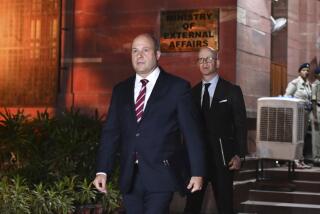Defecting Soviet Envoy ‘Safe and Well in U.S.’
NEW DELHI — The American Embassy confirmed Monday that a Soviet diplomat has defected to the United States and has been granted asylum. At the same time, it denounced the killing of another Soviet Embassy official.
A statement issued by the U.S. mission here said that Igor Gezha, a third secretary in the information department of the Soviet Embassy in New Delhi, “is safe and well in the United States.”
It added that there is “no connection between the defection and the subsequent unfortunate murder of Soviet official Valentin Khitzichenko,” an engineer in the Soviet Embassy’s economic section who was shot to death in his car last Thursday.
Augmented Security
The normally bustling Soviet Embassy and trade mission were quiet and under increased security Monday. Private guards patrolled the gates of Soviet residences.
Normally, the Soviet diplomatic community here is relatively accessible. Hundreds of Russian envoys, technicians and journalists live among Westerners and wealthy Indians in the city’s better neighborhoods. But since the defection of Gezha, who went jogging and vanished March 17, and the slaying of Khitzichenko four days later, the Soviet residents have all but disappeared from public view.
“With all these killings and things, we don’t know what will happen,” a Soviet journalist here said. “We are all being very careful.”
U.S. officials tried to ease the tension by issuing a statement denouncing the killing of Khitzichenko. “The U.S. government,” it said, “deplores and condemns such acts of terrorism, and it has no information concerning the perpetrators of the attack.”
India Critical of U.S.
Indian government officials, possibly fearing that the two incidents might affect a visit to the Soviet Union scheduled later this week by Defense Minister P.V. Narasimha Rao, were critical of the United States for saying nothing about the defection for several days.
“We have made known our serious concern to the U.S. government about this incident and asked them to let us have full details surrounding it,” Deputy Foreign Minister Khurshed Alam Khan said in a report to Parliament. “The government of India is also examining all aspects of the case as to how an official of the Soviet Embassy could have left India clandestinely.”
U.S. officials have not disclosed how Gezha, 37, got out of the country. American diplomatic sources said he did not go to the embassy for asylum.
An Indian press account suggested that Gezha managed to cross the open border into Nepal--no less than 175 miles away at its closest point--and sought asylum there. Gezha’s passport, like those of most Soviet officials, was kept at the Soviet Embassy. He left behind his wife and 10-year-old daughter.
The Soviet Embassy suggested Monday that Gezha was spirited out of the country against his will, the Associated Press reported.
Edited Soviet Publication
“The picture of the disappearance of Mr. Gezha is not clear at this stage,” spokesman Vladimir N. Tsatsyn said. “But taking into account the nature of this man, it is doubtful he was acting voluntarily.”
Gezha had worked in India for five years and had been due to return to Moscow later this year. He was an editor of a propaganda magazine, “Soviet Land,” published by the embassy, was considered a low-ranking official and was unlisted in the government’s diplomatic book.
The police, according to Commissioner Suryakant S. Jog, believe that Khitzichenko, 48, was the victim of an anti-Soviet group, possibly a militant Afghan refugee organization.
Jog said he did not believe that Khitzichenko was singled out for any personal reason, although that has not been ruled out. “It was more abstract than that,” he said. “They had as their target a diplomatic car. It did not matter who was inside.”
A Ukrainian group claimed responsibility for the killing in a telephone call to a news agency in New York, but the police here believe that Afghan refugees are a more likely possibility. There are 6,000 to 9,000 Afghan refugees in New Delhi, including many from fundamentalist Islamic groups bitterly opposed to the Soviet military presence in their homeland.
More to Read
Sign up for Essential California
The most important California stories and recommendations in your inbox every morning.
You may occasionally receive promotional content from the Los Angeles Times.










